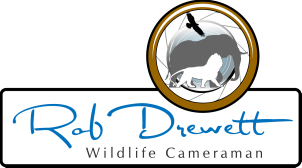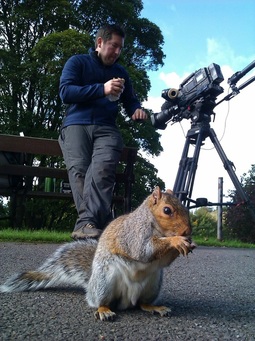 Me and a Grey squirrel taking a lunch
break
Me and a Grey squirrel taking a lunch
break
From time to time I get people asking me for advice on how to break into the wildlife film making industry. I would never profess to know a solid route in and everything there is to know about becoming a wildlife cameraman.
There are a lot of fantastic cameramen/women out there that also have some great advice on what you should do and I will add some links on at the end. What I can do is tell you what I did to get so lucky…
There was a stage in my life where I would be watching programmes like Blue Planet, Life and Planet Earth and all I would be wishing for is that I could be filming those incredible sequences.
I soon realised that wishing and doing are about as far away from each other as you can get.
There are a lot of fantastic cameramen/women out there that also have some great advice on what you should do and I will add some links on at the end. What I can do is tell you what I did to get so lucky…
There was a stage in my life where I would be watching programmes like Blue Planet, Life and Planet Earth and all I would be wishing for is that I could be filming those incredible sequences.
I soon realised that wishing and doing are about as far away from each other as you can get.
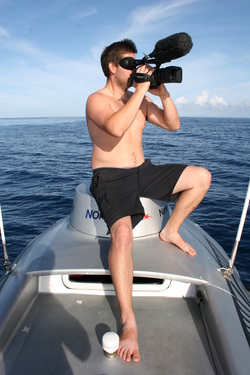 On top of Earthrace
On top of Earthrace
If this is truly the path you want to follow then be prepared for a lot of periods of being broke, being told sorry I cant help you, or not hearing anything back at all, going through the pain of keep on refreshing your email inbox and finding nothing.
With a huge amount of tenacity, dedication and belief though anyone can do their dream job!
Even when you finally arrive into to the splendour of being a wildlife cameraman and all the joys and excitement that brings, you never stop learning, there is always someone better than you, its really hard work and some of the time totally boring (hanging around in airports, stuck in hides without a glimpse of even a leaf moving) But you are always striving for that bit of filming magic and when that happens nothing can beat it.
With a huge amount of tenacity, dedication and belief though anyone can do their dream job!
Even when you finally arrive into to the splendour of being a wildlife cameraman and all the joys and excitement that brings, you never stop learning, there is always someone better than you, its really hard work and some of the time totally boring (hanging around in airports, stuck in hides without a glimpse of even a leaf moving) But you are always striving for that bit of filming magic and when that happens nothing can beat it.
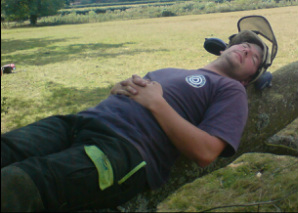 I was getting bored of being a Tree surgeon
I was getting bored of being a Tree surgeon
So my career advice for anyone trying to break it into the wildlife film making industry would be, don’t give up!
When I left school I did not really know what I wanted to do, I went through numerous different jobs. I then found a job that kept me outside green keeping. After a while I wanted to go in a slightly different direction so I studied as an Arboriculturalist and became a Tree Surgeon.
Even though I was outside with a good job that I enjoyed it wasn’t enough. I still wanted to travel around the world capturing wildlife in action, like I was seeing the camera crews on the “Making of” sections of my favorite shows.
So I saved up some money and traveled through South East Asia on my way to work for a year in Australia.
Whilst in Thailand on an Island called Koh Tao I discovered Scuba Diving, this activity changed my life. I always had a camera in my hand anyway so I just combined the two and started my career as an Underwater Cameraman.
When I left school I did not really know what I wanted to do, I went through numerous different jobs. I then found a job that kept me outside green keeping. After a while I wanted to go in a slightly different direction so I studied as an Arboriculturalist and became a Tree Surgeon.
Even though I was outside with a good job that I enjoyed it wasn’t enough. I still wanted to travel around the world capturing wildlife in action, like I was seeing the camera crews on the “Making of” sections of my favorite shows.
So I saved up some money and traveled through South East Asia on my way to work for a year in Australia.
Whilst in Thailand on an Island called Koh Tao I discovered Scuba Diving, this activity changed my life. I always had a camera in my hand anyway so I just combined the two and started my career as an Underwater Cameraman.
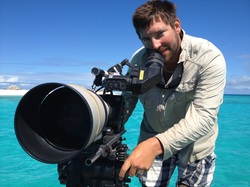 Standing on a platform in the middle of the Pacific
Standing on a platform in the middle of the Pacific
Of course it was not as easy as just picking up the camera and housing and off we go, I had to film students for many hours learning to dive and then editing a nice little video for them, but this is not where I wanted to be and I am sure Peter Scoones would not be seen dead selling his soul in this manner. It was however a means for me to hone my skills.
I came home to work out how I could achieve the impossible.
Well first I sent out a lot of emails to a lot of people begging them to “give me a break”. Eventually if you send enough out the odds get better and I managed to secure myself an amazing job working as an Underwater Cameraman for the Save Our Seas Foundation. So I was to up sticks and live in Jeddah, Saudi Arabia.
I came home to work out how I could achieve the impossible.
Well first I sent out a lot of emails to a lot of people begging them to “give me a break”. Eventually if you send enough out the odds get better and I managed to secure myself an amazing job working as an Underwater Cameraman for the Save Our Seas Foundation. So I was to up sticks and live in Jeddah, Saudi Arabia.
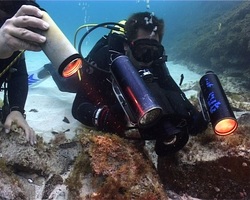 Filming Spanish Dive Adventures
Filming Spanish Dive Adventures
Eventually I moved on to live in Spain and went out and secured myself a slot for a new show on SKY’s Living In Spain Channel, called “Spanish Dive Adventures”. This was a 9 part series that I produced, filmed and edited, with my own small crew. It was a huge learning curve and I learn't a lot about story making and absorbed a lot from my other (more experienced) team members. Knowing who and what to learn from your peers is something is an asset. Never think you can’t learn anymore.
I then found a new path, which took me down the observational documentary route.
In 2007 myself and 3 other crew-members beat the world record for a complete circumnavigation of the globe in the fastest time by powerboat (Earthrace). The History Channel in the US had commissioned a show and I was the on board cameraman. This was truly a test of endurance, patience, sleep deprivation and coping with extremes but I loved it! All of which are part of being a wildlife cameraman.
So after finishing on Earthrace. I returned back to the UK. Now with a bit more experience behind me. This is where I made my best move. I applied to be a volunteer at the Jackson Hole wildlife film festival in the US. Every year the UK and the US alternate a wildlife film festival and attending these are a great way of getting to know people in the industry.
In fact getting to know people in the industry is by far the most important way in. You can be the best filmmaker in the world but without getting known by the right people you will still be filming for yourself.
After the film festival I moved to Bristol, as there were a few doors opening, Icon films took me under their wing.
I then found a new path, which took me down the observational documentary route.
In 2007 myself and 3 other crew-members beat the world record for a complete circumnavigation of the globe in the fastest time by powerboat (Earthrace). The History Channel in the US had commissioned a show and I was the on board cameraman. This was truly a test of endurance, patience, sleep deprivation and coping with extremes but I loved it! All of which are part of being a wildlife cameraman.
So after finishing on Earthrace. I returned back to the UK. Now with a bit more experience behind me. This is where I made my best move. I applied to be a volunteer at the Jackson Hole wildlife film festival in the US. Every year the UK and the US alternate a wildlife film festival and attending these are a great way of getting to know people in the industry.
In fact getting to know people in the industry is by far the most important way in. You can be the best filmmaker in the world but without getting known by the right people you will still be filming for yourself.
After the film festival I moved to Bristol, as there were a few doors opening, Icon films took me under their wing.
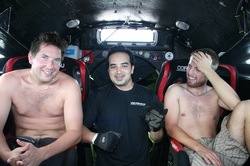 At the helm on Earthrace
At the helm on Earthrace
Then making my way through the various independent production companies I then applied for the BBC wildlife cameraman bursary scheme, which I was successful on getting. This position is seen as the golden ticket in to the NHU. In the scheme you get hands on with all the latest equipment and a lot of training in all areas of natural history film making. But by far the most rewarding aspect of this position is when you get to go on a shoot as a 2nd camera with an experienced cameraman, for me this was the most beneficial learning experience. The bursary scheme is priceless and if you have some experience behind you already it is well worth giving it a shot.
So why am I telling you this. What I am trying to say there is not one particular way into the industry. It does not matter if you have not been to Uni for a degree in zoology or wildlife film-making, what really matters is that you want this more than anything in the world and you will try your hardest to succeed.
So why am I telling you this. What I am trying to say there is not one particular way into the industry. It does not matter if you have not been to Uni for a degree in zoology or wildlife film-making, what really matters is that you want this more than anything in the world and you will try your hardest to succeed.
|
These Cameramen/Women have some amazing advice:
Warwick Sloss Charlie Hamilton James Sophie Darlington Justine Evans Jon Aitchison |
